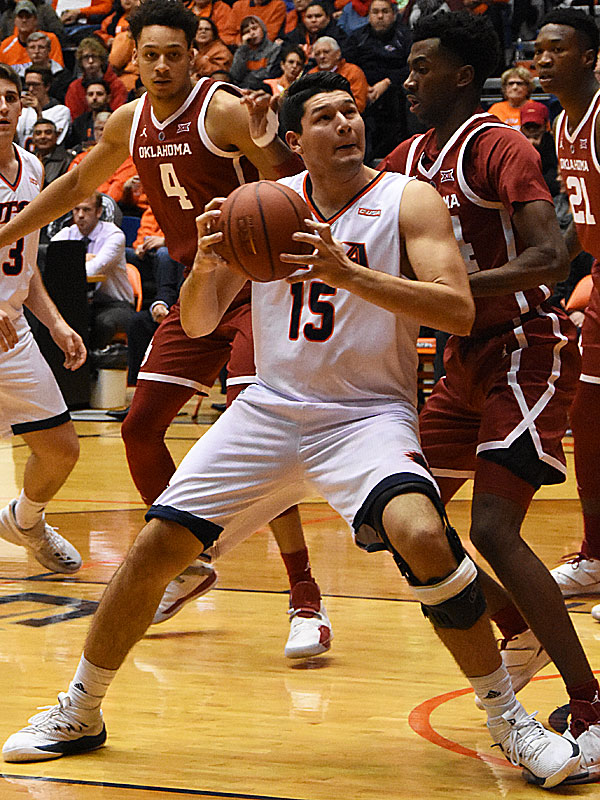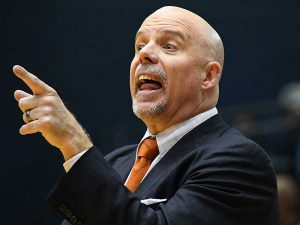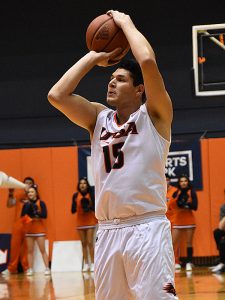
Forward Adrian Rodriguez (No. 15) says he feels like the UTSA Roadrunners ‘are taking the right steps’ in preseason practices to become a winning team. – Photo by Joe Alexander
Several months ago, UTSA forward Adrian Rodriguez approached Steve Henson with a proposition. He told the Roadrunners’ fifth-year head coach that he wanted to lose some weight in attempt to maximize his physical conditioning for the upcoming college basketball season.
Rodriguez emphasized that if he ever failed to live up to his daily resolve, he wanted Henson to step in, to remind him of the promise he made. The pact seems to be paying dividends. With the season-opener scheduled for Wednesday night at Oklahoma, UTSA has a much-improved, front-court player on its hands.
Trimmed down to 240 pounds on a 6-foot-7 frame, he is feeling good, and moving well.
“Adrian Rodriguez has shown real, real positive signs in the … last five, six weeks,” Henson said. “He’s in probably the best shape of his life. Or, since he’s been here, post injury. He’s been really, really good, noticeably different with his conditioning, with his mindset.
“So we anticipate him playing quite a bit … We’ve been really, really pleased with him.”

UTSA coach Steve Henson says Adrian Rodriguez’s commitment to offseason conditioning has paid dividends. – Photo by Joe Alexander
In a telephone interview on Thursday morning, the UTSA redshirt junior from Tulsa (Okla.) Union High School talked about his humble roots as a player, about his high hopes for the team and about the genesis of his heart-to-heart talk with Henson.
“At some point at the beginning of summer,” Rodriguez said, “after (the start of) the quarantine, I just felt like I had to do something different. You know? Like, the first three years, (with) the injuries and things like that, it didn’t really go my way. I just felt like I had to do something different.
“So, I made it a point to lose weight and improve on the physical aspect. And so, I went in and talked to (the coach) to make sure he held me accountable, that I didn’t fall off.”
In some ways, UTSA fans haven’t seen the real Rodriguez yet even though he has been on the team for three years.
Rodriguez, a former all-state player in high school, hasn’t made many headlines at UTSA to this point. He has yet to show up on many highlight reels. To this point, he’s known mostly for his hard luck.
In 2017, Rodriguez blew out his knee in his first college game and was lost for the season. In the past two years, he has enjoyed his moments as an aggressive defensive player in the post. But he has come off the bench primarily, averaging 8.7 minutes and 11.4 minutes, respectively.
As dawn breaks on a new season, however, his frustrating nights on the bench could be coming to an end. Assistant coach Scott Thompson echoed Henson, predicting “a big role” for the player if he continues to work for it.
“The reason we went after Adrian so hard after we got the job (here) was because of his (high) IQ and feel for the game,” Thompson said. “He’s an incredible teammate. He’s a winner. You know, that knee injury for him was devastating for his career.
Getting in ‘peak condition’
“He’s just had to work really hard to get his conditioning back, and that’s always been the big thing with him. Being under-sized, as a front line guy, you just have to be in peak condition, and he’s worked hard to get back into shape.”
In the past few years, Rodriguez’s emotional fire has been evident. At practices, he will get so wrapped up in five-on-five drills that he sometimes shouts and slams his hands on the floor after a defensive stop.
In practices and in games, Rodriguez is always talking, trying to communicate to help his teammates. He’s sort of like former University of Oklahoma forward Ryan Spangler, Thompson said. When OU reached the NCAA Final Four in 2015-16, Lon Kruger was the head coach and Buddy Hield was the scoring machine.
Henson and Thompson were on the Sooners’ staff, just before they both came to UTSA.

Rodriguez averaged 11.4 minutes in 23 games last year. A screener on offense and a defensive specialist, he produced 1.7 points and 3.3 rebounds.
“The guy on that that team that didn’t get the credit he deserved was Ryan Spangler,” Thompson said. “He was our four-five man who kind of anchored our defense. Adrian kind of has that same feel. He’s able to call out actions … you know, to communicate to guys on how to guard ball screens.
“He’s advanced in his basketball IQ … He doesn’t need a ton of reps (with starters), and he picks up things very quickly.”
Born in El Paso to parents who grew up in Mexico, Rodriguez lived in Texas for awhile, moved to Colorado and then moved on to Tulsa when he was in fourth grade. He said he didn’t really follow basketball, let alone play it, until his eighth-grade year.
“And that was only because my brother played on varsity,” he said. “That year, I was horrible.”
Given his limitations, Rodriguez did start to show some resolve in learning the game. He started to pick the brain of his father, Abel Rodriguez, who once played collegiately in Mexico and for Mexico’s 19-and-under program.
Family roots in Mexico
“My dad used to play, back in his day, and he was always into the little things (in the game),” Adrian Rodriguez said. “Like, setting good screens. Setting screens, rolling and talking. He wasn’t the most skilled guy. But he was always on the floor because he would do everything right. With effort plays, things like that.
“So from the very beginning, everything I learned was (how) to do the little things.”
Pretty soon, the little things turned into big things.
Under coach Rudy Garcia, Rodriguez played on a high school team at Tulsa Union that won state when he was a freshman and then added regional titles every other year. As a senior, he was all-state while averaging 14.1 points, 8.4 rebounds, 2.3 assists and 1.6 blocks.
Now at UTSA, he’s getting ready to embark on his fourth season with the Roadrunners, all while making strides toward a degree in mechanical engineering. He’s got a 3.0 grade-point average and seems to be well on his way.
Sometimes, he wonders how it all happened.
‘How did I get here?’
“I have a little saying, like, ‘How did I get here?’ ” he said. “It’s all crazy. Until my junior year (in high school) I didn’t even think I was going to be able to play (in college). From that mindset to where I am now, it’s crazy.”
In his injury-scarred first season at UTSA, the Roadrunners won 20 games. In his second year, they won 17. Both seasons, UTSA finished 11-7 in Conference USA, competing with and beating some of the best teams in the league. Last year, the Roadrunners suffered a fall, with the team finishing 13-19 overall and 7-11.
Despite the pandemic, preseason workouts in the past few months have been productive, Rodriguez said, and an attitude adjustment may hold the key to it all.
“I think we look really good right now,” he said. “The chemistry is there. It seems like everybody is setting their egos aside and really playing for one thing, and that’s to win. Last year we had a chance to be really good and it didn’t go our way. I think this year, we’re taking the right steps to get where we need to be.”
In terms of his own situation, Rodriguez said it’s encouraging to hear that the head coach has noticed how hard he has worked personally to make it happen.
“It re-assures me that what I’ve done is the right thing,” he said. “I believe everything (in offseason conditioning) that I’ve been doing is not to benefit me — but to help the team. So if he sees that improvement, then, to me, it means we’re (on track) to win. And so, that’s the best part, for me.”
